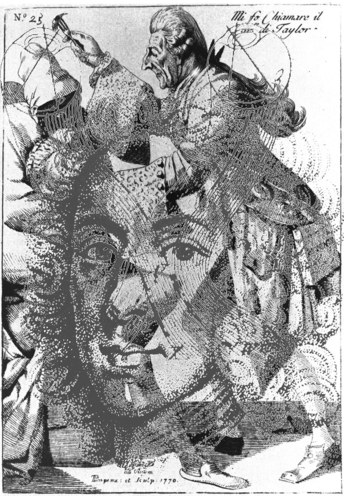John Taylor1708–1772
Taylor was an oculist of note and notoriety. The note derives from his books on the eye whereas the notoriety relates to his careless couching of cataracts among the nobility of Europe. He has been referred to as “the king among all itinerant oculists”. He was lauded and lamented in equal manner: laudations issued from his own pen and those of his son, also an oculist named John; lamentations were uttered by his patients. The portrait of Taylor is combined with an illustration of him conducting an operation on a hapless patient. He became a self-styled “Ophthalmiater, Pontifical, Imperial, and Royal” and his arrogance did much to antagonise his fellow physicians and surgeons. Much of his life was spent travelling around Europe where he ministered to many notables with much theatricality: operating and theatre were rarely so well matched. He was fond of ennobling himself in the countries in which he operated: he appears variously as Chevalier Taylor when writing in French, Ritter von Taylor when his works were published in German, and Cavalieri di Taylor on his visits to Italy. Oculists were often considered to be the quintessential quacks. Dr. Johnson defined a quack as “a boastful pretender to arts which he does not understand”. With regard to medicine, a quack was “one who proclaims his own medical abilities in publick places”. There were few who quacked louder than Taylor. Eighteenth century ophthalmology in Britain lagged behind that on Continental Europe, and the oculists practicing it were duly designated by this derogatory label: “Among these travelling quacks the name of ‘Chevalier’ Taylor stands pre-eminent for unblushing effrontery, blatant self-adulation, and all the methods of the charlatan”. He was known personally to Dr. Johnson who said of him: “Taylor was the most ignorant man I ever knew… he was an instance of how far impudence will carry ignorance.” Chevalier Taylor is remembered more for his bombast than his books. His operations on the eye were probably no less successful than those of his contemporaries, and his treatment of strabismus contained ideas that were to take a century to become incorporated into ophthalmology. His occasional insights should not be overshadowed by his astonishing arrogance.
